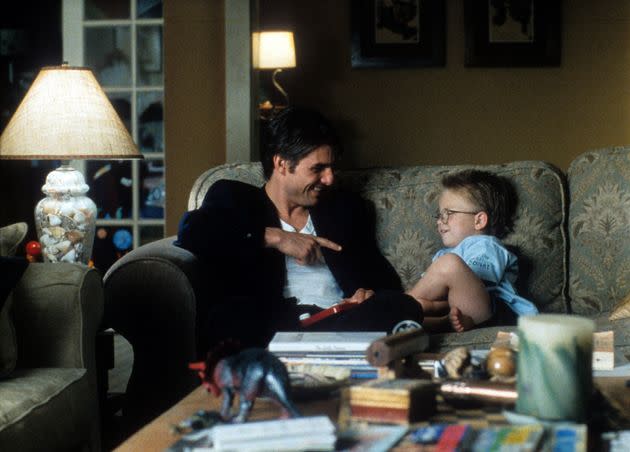In 1996, 'Jerry Maguire' Gave A Single Mother Permission To Want More — And Get It

- Oops!Something went wrong.Please try again later.
- Oops!Something went wrong.Please try again later.
- Oops!Something went wrong.Please try again later.
Renée Zellweger in a scene from the 1996 film "Jerry Maguire." (Photo: Columbia TriStar via Getty Images)
The single mother really went through it in 1990s movies. She is the desperate addict who tries to sell her kid to her cop neighbor for $3,000 in “Deep Cover.” She’s the overwhelmed ex-wife of a voice-over actor who was a terrible partner in “Mrs. Doubtfire.” She’s also the minimum-wage worker whose son is taken away from her by Child Protective Services in “Set It Off.” In other words, she rarely has the opportunity to consider her actual desires that extend far beyond the needs of her child.
But that shifted 25 years ago today with writer-director Cameron Crowe’s “Jerry Maguire.” Dorothy Boyd (Renée Zellweger), an unfulfilled employee at a ruthless sports agency and mom to her young son Ray (Jonathan Lipnicki), risks it all for a chance to feel, in her words, inspired. After reading her colleague’s (Tom Cruise in the eponymous role) late-night manifesto — or as he calls it, “a memo” — compelling his fellow workers to stop “sleepwalking” through life, she packs up her desk and follows him out the door to join his new venture.
It’s important to note here Dorothy’s privilege. She’s a young white mother sharing a house with her sister, Laurel (Bonnie Hunt), and, though she has a support system, could land another job relatively quickly. In fact, she is offered another one later in the movie. But she doesn’t want just any job. She wants one that will make her happy — and one that she deserves.
Since becoming a widow before 30, Dorothy’s life has been centered on her child, and she has often forgone basic social and romantic activities. She even laments to her sister that she is “the oldest 26-year-old in the world,” saying: “Do you know what most other women my age are doing right now? They are partying in clubs, trying to act stupid, trying to get a man, trying to keep a man. Not me, Laurel. I’m trying to raise a man.”
Dorothy goes on like this for barely over a minute and yet Crowe manages to encapsulate the experiences of so many single mothers clawing for something more than three lame lovers in the last four years who “all ran a distant second to a good book and a warm bath.”
What Dorothy is really talking about throughout all of “Jerry Maguire” — like her male counterparts in the film — is wanting more. For Jerry, that is about loyalty and professional decency. For his only client, football star-in-the-making Rod Tidwell (Cuba Gooding Jr.), that’s about financial gain. But much like his equally wistful 1989 classic “Say Anything,” Crowe masterfully extends the male-fronted romantic comedy to include a woman’s perspective on love and longing.
As much as Dorothy yearns to be in a good, happy relationship, she can’t think only about herself. Ray is also top of mind. So, even when she finds herself falling for the emotionally unavailable Jerry, a 35-year-old man inspiring her on his quest to achieve something more, she can’t help but also be smitten with his mutual affection toward her child.
Still, as much as “Jerry Maguire” paints a refreshing portrait of a single mother, Crowe smartly doesn’t rely on his own point of view as a male filmmaker to effectively portray Dorothy’s experience. Rather, he constantly challenges Jerry as a man to consider the specific dynamic of his relationship. “What do you know about dating a single mother?” Jerry asks Rod. To which Rod responds, “Single mothers don’t date. They’ve been to the circus. If you love her, you’ve got to tell her.”
This is a reductive yet genuine exchange between two men who are likely pondering the images they’ve seen of single mothers as women whose experiences demand that they be taken seriously romantically, when that is what most women want. But at this point in his story, Jerry is moved by Dorothy’s commitment to him and his dreams, so he asks her to marry him. When her desires and expectations are not met, though, it’s a sobering realization for them both.
“What do you want?” Jerry asks. “My soul or something?” Without missing a beat, Dorothy answers: “Well, why not?” The quickness of her response is a lightbulb moment for the audience. His desire for someone to stand with him in business and life is just as intense as her desire to be with someone who immerses his entire being into their love for each other.
But Jerry says he’s “not built” to commit in that way, though he considers himself a practical man who refuses to bail on anything just because it gets tough, including their relationship: “I’m not a guy who runs. I stick.” This sounds like little more than a vow to finish a job assignment or check an item off a list, and Dorothy knows it. More importantly, she knows that as much as she desires love, she wants more than this.

Tom Cruise points to Jonathan Lipnicki in a scene from the film "Jerry Maguire." (Photo: Columbia TriStar via Getty Images)
“I don’t need you to stick,” she tells him. “On the surface it looks fine. I’ve got this great guy, and he loves my kid, and he sure does like me a lot. And I can’t live like that. It’s not how I’m built.”
Dorothy’s last statement here is such a necessary reminder that the two love in divergent ways, and that she doesn’t need a man to hang around to fulfill an obligation to her. Thankfully, she is empowered to abandon this kind of relationship, but the breakup doesn’t discourage her from desiring love. In fact, she tells Laurel’s divorced women’s support group that is huddled in their living room that“men are the enemy.” And yet: “I still love the enemy.”
That line might sound contradictory, but these final moments in “Jerry Maguire” highlight a woman who’s experienced grief, yearning, and a more recent heartbreak that have helped push her not to accept anything less than her own desires. It is only when she reaches this point that true love — in the form of a more mature Jerry — returns to her life.
And finally, she gets to realize a dream.
This article originally appeared on HuffPost and has been updated.
